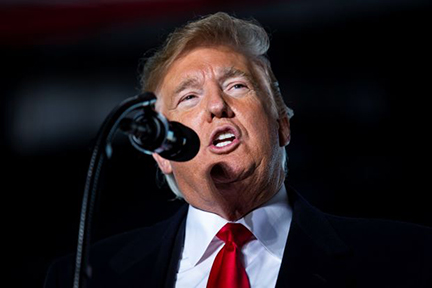WASHINGTON, (Reuters) – With congressional elections a week away, President Donald Trump yesterday said he will seek to scrap the right of citizenship for U.S.-born children of non-citizens and illegal immigrants as he tries again to dramatically reshape immigration policies.
Reviving his support for a legally questionable theory, Trump told the Axios news website he would issue an executive order on so-called birthright citizenship, an issue that has long rankled some conservative Republicans.
Trump’s previous calls to end the practice have resonated with his political base, but moderate Republicans and some legal experts say Trump is running afoul of the U.S. Constitution.
Under the Constitution’s 14th Amendment, enacted in the wake of the Civil War to ensure that black Americans previously subject to slavery had full citizenship rights, citizenship is granted to “all persons born or naturalized in the United States.”
It has been routinely interpreted over the years to confer citizenship to people born in the United States whose parents are illegal immigrants.
Trump, who has made rhetoric against illegal immigrants a central plank of his presidency, originally spoke out against birthright citizenship when he first started running for president in 2015.
One Republican member of Congress, frequent Trump ally Senator Lindsey Graham, said he would move to introduce legislation “along the same lines” as Trump’s order.
Neither Graham nor Trump gave any details about the latest plan. The White House did not respond to a request for comment.
Other Republicans were critical. U.S. House of Representatives Speaker Paul Ryan said Trump could not scrap the right with the stroke of a pen.
“You cannot end birthright citizenship with an executive order,” Ryan, the top Republican in Congress, said in an interview with radio station WVLK, the Washington Post reported.
In the run-up to the Nov. 6 congressional elections, Trump has seized on a caravan of migrants from Central America who are trekking through Mexico toward the United States, calling the migrants a threat. On Monday, the United States said it would send over 5,200 troops to help secure the border with Mexico.
Bill Kristol, editor at large of the conservative Weekly Standard and a Trump critic, said in a Twitter post:
“The shrinking caravan of refugees isn’t a threat to the country or the constitutional order. A president who tries to end birthright citizenship by executive order is.”
LEGAL ARGUMENT
Trump, whose hard-line stance against illegal immigration helped him win the White House, is emphasizing his policy to drum up support for fellow Republicans in the elections as Americans are sharply divided and grappling with race and national identity.
Opinion polls show Democrats have a chance at achieving the net gain of 23 seats they need to win a majority in the House but they have a longer shot at the Senate, where they need a gain of two seats.
Democratic House Leader Nancy Pelosi accused Trump of trying to distract attention from healthcare policy, which Democrats have identified as a top election issue.
“President Trump’s new claim he can unilaterally end the Constitution’s guarantee of citizenship shows Republicans’ spiraling desperation to distract from their assault on Medicare, Medicaid and people with pre-existing conditions,” Pelosi said in a statement.
The legal argument espoused by conservative activists for excluding children of illegal immigrants would likely be based around the language in the 14th Amendment that says people born in the United States are citizens if they are “subject to the jurisdiction” of the United States.
Activists seeking to limit immigration, including Michael Anton, who wrote an article on the subject for the Washington Post in July, argue that illegal immigrants are not under the jurisdiction of the United States and therefore their children born on U.S. soil should not be U.S. citizens.
Most legal scholars say the jurisdiction language denies citizenship only to those who are not bound by U.S. law, such as the children of foreign diplomats.
Ilya Shapiro, a lawyer with the libertarian Cato Institute, said that although there is a debate in academic circles among conservatives on whether Congress could legislate on the issue without running afoul of the 14th Amendment, “it’s not something that can be done by executive action alone.”
At least since 2005, Republicans in the U.S. Congress have regularly offered legislation ending birthright citizenship for children born in the United States if their parents were in the United States illegally. But the legislation has never advanced, even when the House of Representatives or Senate was under Republican control.
Vice President Mike Pence said the plan may not be unconstitutional, telling Politico in an interview that while “we all cherish” the 14th amendment, the U.S. Supreme Court has not weighed in on the issue entirely.
“But the Supreme Court of the United States has never ruled on whether or not the language of the 14th amendment, subject to the jurisdiction thereof, applies specifically to people who are in the country illegally,” Pence said.
The Supreme Court has not ruled specifically on the issue of whether illegal immigrants can be denied birthright citizenship.
In 1898, however, in the case of a man born in San Francisco to Chinese immigrants who lived permanently in the United States, the court ruled that the government could not deny him citizenship.
Saikrishna Prakash, a conservative legal scholar at the University of Virginia, said Trump faces long legal odds to ending citizenship as a birthright.
“We’re a nation of immigrants so if I were to bet I would think the president is going to lose,” he said.










